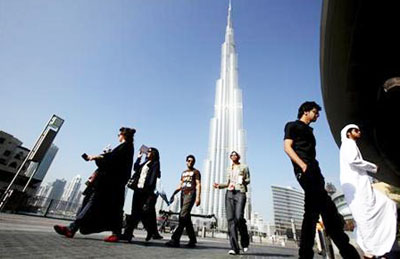
UAE economy to bounce back as oil prices recover, says IMF
DUBAI, July 15, 2017
The UAE is weathering the post-2014 oil shock well and the country's economic activity is expected to strengthen gradually in the coming years with firming oil prices and other global indicators, and an easing pace of fiscal consolidation, according to the International Monetary Fund (IMF).
The IMF statement came after its executive board concluded the Article IV consultation with the UAE.
Economic performance was subdued during most of 2016. Together with weaker oil prices and slower oil output growth, the postponement of some public infrastructure projects and a slowdown in global trade caused growth to moderate to 3 per cent from 3.8 per cent in 2015.
Inflation eased to 1.8 per cent from 4.1 per cent in 2015, reflecting softer domestic demand and declining rents. Despite continued fiscal consolidation, lower oil revenues widened the overall deficit to 4.3 per cent of GDP from 3.4 per cent of GDP in 2015, said the IMF in its statement.
Likewise, the current account surplus shrank to 2.4 per cent of GDP from 4.7 per cent of GDP in 2015. Although impairment charges rose amid the economic slowdown, banks remained well capitalized and liquid, said the IMF in its review.
According to IMF, the nonoil growth is projected to rise to 3.3 per cent in 2017 from 2.7 per cent in 2016, reflecting increased domestic public investment and a pickup in global trade.
Over the medium term, nonoil growth is expected to remain above three per cent, supported by accelerating investment in the run up to the Expo 2020. The planned VAT introduction in 2018 is not expected to have a significant adverse impact on growth, it stated.
According to IMF, financial conditions tightened, and growth slowed mainly due to lower oil revenues and weakening fiscal and external positions.
The weaker economy has now elevated risks of bank loan delinquency, requiring higher provisioning.
However, the UAE’s financial buffers, safe-haven status, sound banks, and diversified and business-friendly economy are helping it cope with the shock, said the IMF review.
Growth is projected to recover over the next few years, as the pace of the necessary fiscal consolidation eases, global trade regains momentum, and investment, including for Expo 2020, accelerates, it stated.
This outlook is subject to downside risks, stemming mainly from a further sustained decline in oil prices, tighter financial conditions, a rise in protectionism and an intensification of regional conflicts.
Although the fiscal position remains sustainable, an improvement in the budget balance is needed to ensure that an equitable share of the oil income is saved for future generations. Ample fiscal space allows deficits to decline gradually while mitigating the adverse impact on the economy and the financial sector.
Importantly, improving the efficiency of public education spending, in conjunction with education reforms, and gradually raising healthcare spending would help nurture talent and foster a more productive and inclusive economy.
Controlling the size and wages of the civil service while promoting entrepreneurship and female participation would improve private sector employment, including for women, said the IMF report.
To ensure credibility, fiscal adjustment should be accompanied by strengthening the medium-term policy framework and improving transparency, it added.-TradeArabia News Service







